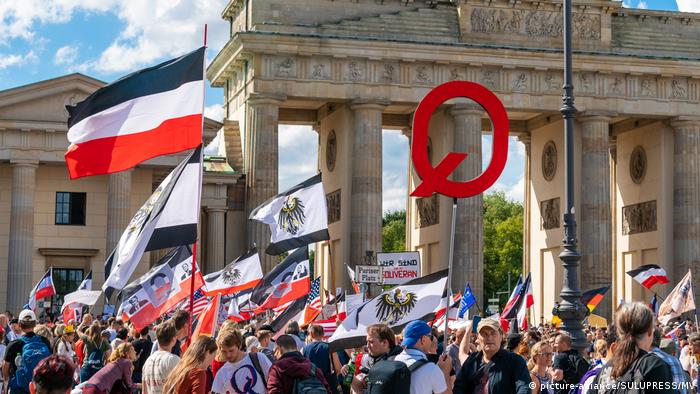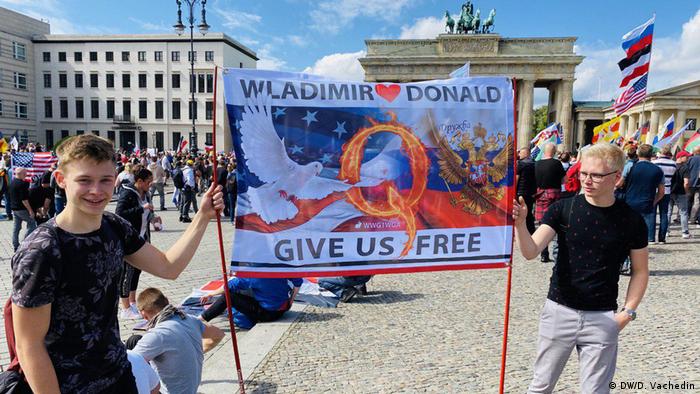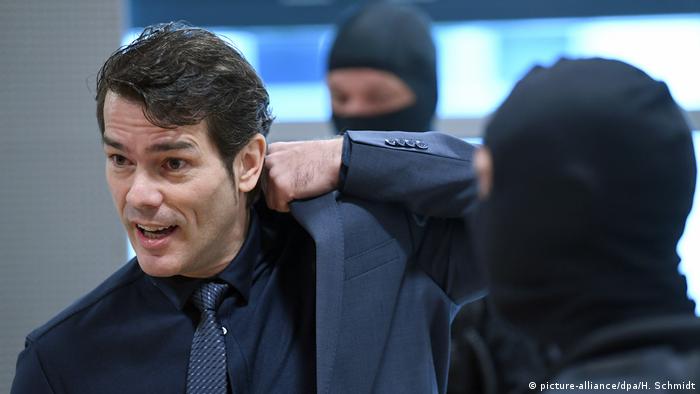Extremists could hijack coronavirus rallies in Germany, warns BfV head
Protests against coronavirus lockdown measures have been gaining momentum. Extremists could now use the movement for their own ends, the chief of Germany's domestic security agency, Thomas Haldenwang, told DPA.

The recent anti-lockdown protests have seen many different groups take to the streets to decry the government's efforts to curb the pandemic. However, right-wing extremists could use the protest movement for their own ends, the head of Germany's domestic security agency BfV, Thomas Haldenwang, said on Tuesday.
"Right-wing extremists and Reichsbürger [members] succeeded in occupying a resonant space, creating powerful images and thus exploiting the heterogeneous protest events," Haldenwang told the DPA news agency.
The 60-year-old lawyer has served as the head of the Federal Office for the Protection of the Constitution, or BfV, since November 2018.
Read more: German government slams Reichstag far-right rush as 'shameful'
The 60-year-old lawyer has served as the head of the Federal Office for the Protection of the Constitution, or BfV, since November 2018.
Read more: German government slams Reichstag far-right rush as 'shameful'
Authorities' concerns about the protests appeared to have been confirmed, added Haldenwang.
'Shameful' attempt to storm the Reichsta
Police had initially banned the anti-coronavirus lockdown protests on safety grounds. They were also concerned protesters would not obey social-distancing and coronavirus health guidelines.
But the rally went ahead in Berlin on Saturday after the police ban was overruled by a last-minute court ruling. Some 38,000 protesters attended.
During the protests, around 300 to 400 protesters rushed the steps of the Reichstag building, where the lower house of Germany's parliament convenes.

THE REICHSBÜRGER MOVEMENT IN GERMANY
What do Reichsbürger believe?
"Reichsbürger" translates to "citizens of the Reich." The nebulous movement rejects the modern German state, and insists that the German Empire's 1937 or 1871 borders still exist and the modern country is an administrative construct still occupied by Allied powers. For Reichsbürger, the government, parliament, judiciary and security agencies are puppets installed and controlled by foreigners.
'Shameful' attempt to storm the Reichsta
Police had initially banned the anti-coronavirus lockdown protests on safety grounds. They were also concerned protesters would not obey social-distancing and coronavirus health guidelines.
But the rally went ahead in Berlin on Saturday after the police ban was overruled by a last-minute court ruling. Some 38,000 protesters attended.
During the protests, around 300 to 400 protesters rushed the steps of the Reichstag building, where the lower house of Germany's parliament convenes.

THE REICHSBÜRGER MOVEMENT IN GERMANY
What do Reichsbürger believe?
"Reichsbürger" translates to "citizens of the Reich." The nebulous movement rejects the modern German state, and insists that the German Empire's 1937 or 1871 borders still exist and the modern country is an administrative construct still occupied by Allied powers. For Reichsbürger, the government, parliament, judiciary and security agencies are puppets installed and controlled by foreigners.

International parallels, conspiracy theories
Reichsbürger have been seen waving Russian flags, leading to allegations that they are funded by Russia with the aim to destabilize the German government. Germany's Reichsbürger are also compared to US groups such as "freemen-on-the-land," who believe that they are bound only by laws they consent to and can therefore declare themselves independent of the government and the rule of law.
Author: Samantha Early, Rina Goldenberg

THE REICHSBÜRGER MOVEMENT IN GERMANY
Who are its members? One was Mr. Germany
According to German authorities, the average Reichsbürger is 50 years old, male, and is socially and financially disadvantaged. The movement's members are concentrated in the southern and eastern parts of Germany. Adrian Ursache, a former winner of the Mister Germany beauty pageant, is also a Reichsbürger and was sentenced to seven years in prison in 2019 for shooting and injuring a policeman.
Warnings were unheeded
The BfV has repeatedly warned that right-wing extremists could try to take the lead in the "very diverse demonstrations," Haldenwang commented to DPA.
Haldenwang's office had noted "increased mobilization by right-wing extremists" both before and during the demonstrations.
The agency has noted various right-wing groups at the rally, including the New Right, the Alternative for Germany (AfD) affiliated Young Alternatives — that has officially disbanded — as well as Reichsbürger members.
"We are observing closely whether the right-wing amalgamation takes on an even larger dimension and whether these actors are becoming capable of connecting with each other," Haldenwang told DPA.
Haldenwang's office had noted "increased mobilization by right-wing extremists" both before and during the demonstrations.
The agency has noted various right-wing groups at the rally, including the New Right, the Alternative for Germany (AfD) affiliated Young Alternatives — that has officially disbanded — as well as Reichsbürger members.
"We are observing closely whether the right-wing amalgamation takes on an even larger dimension and whether these actors are becoming capable of connecting with each other," Haldenwang told DPA.


 Consultant Paul Rusesabagina, who's story "Hotel Rwanda" is based on, signs the movie's poster for charity prior to the Q & A following the Variety Screening Series - "Hotel Rwanda" at the ArcLight Theater on December 6, 2004 in Hollywood, California. Getty Images/AFP - Stephen Shugerman
Consultant Paul Rusesabagina, who's story "Hotel Rwanda" is based on, signs the movie's poster for charity prior to the Q & A following the Variety Screening Series - "Hotel Rwanda" at the ArcLight Theater on December 6, 2004 in Hollywood, California. Getty Images/AFP - Stephen Shugerman














